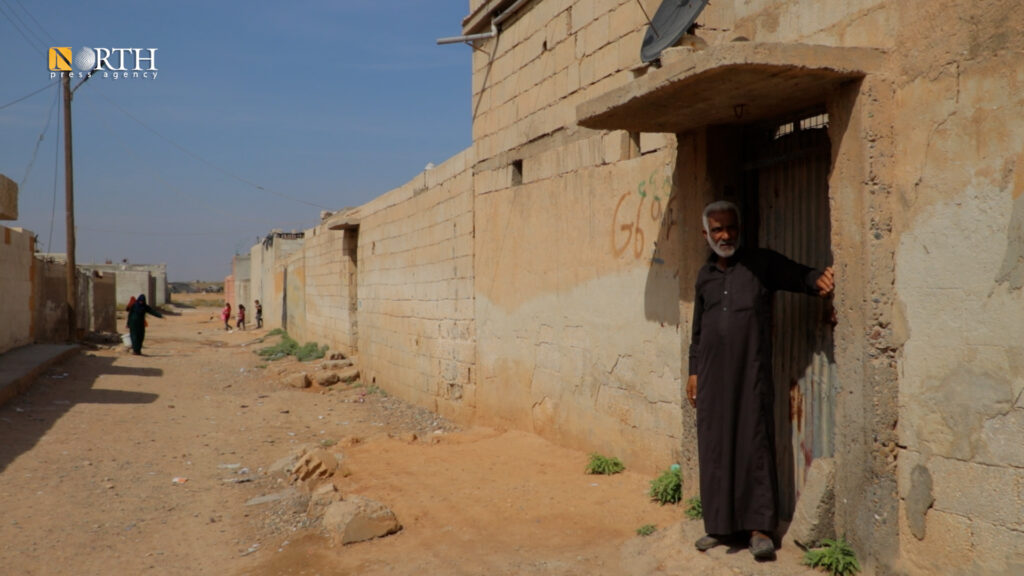4 years of Turkish occupation: tragic journey from Tel Abyad to Raqqa
By Fatima Khaled/Fayyad Muhammad
RAQQA, Syria (North Press) – Muhammad Shehada had nothing to do but sit in front of his small house in one of slums in the city of Raqqa, north Syria. He sat on an old wooden chair, waiting for the night so he could go to his work as a watchman in one of the nearby schools.
Shehada, a 52-year-old IDP from Tel Abyad, narrates his suffering during the war to North Press. He recounts the difficulties he faced with his family, which eventually compelled them to flee their village four years ago.
In October 2019, Turkish forces, along with their opposition factions of the Syrian National Army (SNA), occupied the city of Tel Abyad and its surrounding areas after a military operation dubbed ‘Peace Spring’. About 175,000 people displaced from the area, where the Turkish president claimed to establish a safe zone, according to human rights organizations’ reports.
Like most of Tel Abyad residents who managed to survive the Turkish bombardment and escape imminent death alongside their families, he headed to Raqqa in search of a home where he could live with his family. However, the war inflicted a lasting physical scar upon him, persisting even after surviving death.
Since the occupation of Tel Abyad in October 2019 and over four years, residents have been bearing the brunt of human rights violations by SNA factions and Turkish forces which have always been committed in front of the whole world amid absolute silence. Also, the area has marred by security chaos and human rights violations against civilian residents.
The area also witnesses ongoing clashes and conflicts over power and resources among the SNA factions themselves, which have resulted in casualties among their militants as well as civilian victims. These circumstances prevent thousands of IDPs, accounting for more than 85 percent, from returning to their homes, according to the Synergy Association.

“There are no words to describe the situation we have reached,” said Shehada, as he talked about the tragic he experienced after being forced to leave his home in Tel Abyad and escape with his family to Raqqa.
Upon entering their new house in Raqqa, Shehada suffered a leg injury caused by a mine explosion which was planted in one of the rooms. As a result of the incident, he lost a part of his foot, leaving him with a permanent reminder of the horrors of war.
Shehada lives with his family and his son’s family in a house in one of the slums in Raqqa, currently known as al-Akrad neighborhood. They are obliged to rent this dilapidated house and turn it into their refuge, seeking safety from the ongoing conflicts, as well as, the residence is located near Shehada’s job as a watchman at a local school in the neighborhood.
“After these five years, I still vividly recall the bitterness of displacement. When I look at my amputated feet, all I feel is pain and regret for what has passed and the anticipated suffering yet to come. I have lost hope of returning to my homeland,” Shehada said.
The man would not have sustained his injury if he had not been forced to leave his area due to the war. At that time, he found himself compelled to flee, abandoning his possessions and village. “We used to live a dignified life, but now we are homeless,” he remarked.
He said that he had a house and land, where he and his family worked and lived off its resources. However, all of those properties have now become nothing but illusions. Shehada does not know if they still exist or if they have been reduced to rubble due to Turkey’s attacks on northern Syrian areas.
He is uncertain if his belongings were taken by the militants of the SNA factions, who deliberately seize the possessions of the IDPs and resettle families associated with ISIS and other factions.
Most of the factions affiliated with Turkey are involved in arbitrary arrests and torture. According to the Monitoring and Documentation Department at North Press, during the first six months of this year, 496 individuals were detained, including 79 in Sere Kaniye and 13 in Tel Abyad.
Turkish-backed SNA factions seized more than 5,650 homes, 1,200 shops, and around one million donum (100,000 acres) of farmlands in areas of Sere Kaniye and Tel Abyad. Additionally, 55 villages were depopulated by their original inhabitants, according to the Synergy Association for victims in northeast Syria, according to Synergy.
Shehada and his family were living comfortably at their house working on their land and living off its resources, just like thousands of displaced people from Sere Kaniye and Tel Abyad. However, things have changed in their place of displacement, where the majority live in camps or unsuitable houses due to economic difficulties.
On the fourth anniversary of their displacement, the man can only remember destruction, war, and the pain caused by their forced displacement. Each year on this day, he lives in a state of confusion between the desire to return to their homeland and the loss of hope.
“We were forced to endure difficult living conditions due to displacement, but it is better than returning to death. I cannot take my family back there, but we still wish for it,” he said.

